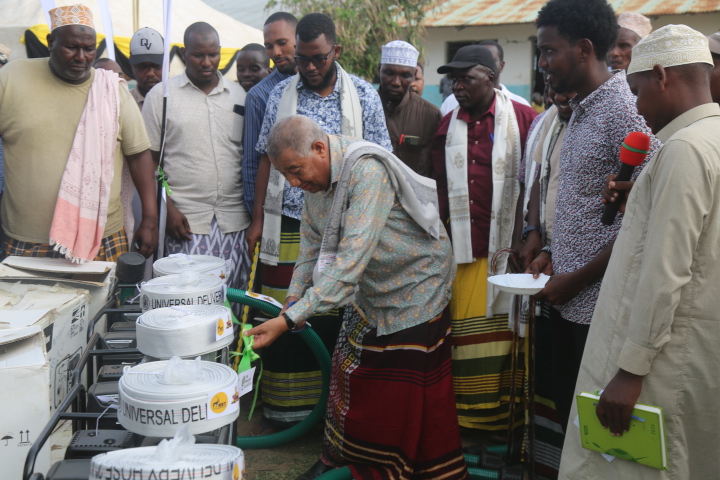The Northern Rangeland Trust (NRT) has partnered with the Ibsa Self-Help Group in Chalaluma Village, Witu Ward, Lamu County, to establish a solar-powered electric fence around a 30-acre communal farm. This innovative project addresses human-wildlife conflict while enhancing food security for the community.
Protecting Farms, Supporting Livelihoods
Located within the Hanshak Nyongoro Conservancy, the project is supported by Innocent Foundation, NRT, and the Lamu County Government. Speaking at the launch, NRT Project Officer Mohammed Said highlighted the significance of this initiative for the Orma community.
“The fence will protect our farms from wildlife such as hippos and buffaloes, which are common in this region near the Tana Delta,” said Said.
The project also integrates a water pump system, sourced from the Tana River, to ensure sustainable irrigation without disrupting wildlife water needs.
Expanding Support Across the Region
In addition to the Chalaluma farm, NRT is distributing 10 more water pumps across Ndera and Lower Tana Conservancy areas to support similar farming ventures. This effort aims to assist pastoralist communities transitioning to agriculture amid challenges posed by climate change.
Galgalo Jaffar, an overseer at the Ibsa Self-Help Group farm, praised the initiative for its timely intervention.
“This project addresses climate change’s impact on our pastoral lifestyle, reducing wildlife conflicts and boosting food production and income,” he stated.
Scaling Up Solutions to Combat Climate Change
NRT Lamu Director Hassan Yussuf Hassan emphasized the organization’s commitment to mitigating climate change impacts on marginalized communities.
“We plan to replicate the solar-powered electric fence across Lamu and Lower Tana Delta areas to reduce human-wildlife conflicts and improve the quality of life,” he said.
Government Pledges Continued Support
Lamu Governor Issa Abdalla Timamy commended the project and announced plans to lease an additional 100 acres for similar initiatives, citing their potential to transform food security in Lamu County.
“The success of the Ibsa Self-Help Group farm shows how these projects can feed not only Chalaluma and Moa but the entire county,” said Timamy.
The governor also promised to provide seedlings and fertilizers for future projects, applauding NRT’s efforts in empowering marginalized communities to overcome challenges related to human-wildlife conflict and climate change.
Conclusion
The solar-powered electric fence initiative demonstrates the power of collaboration in addressing food security, wildlife conservation, and climate change adaptation. With plans for expansion, this project is poised to transform lives across Lamu County and beyond.





